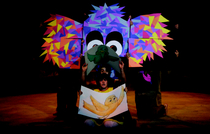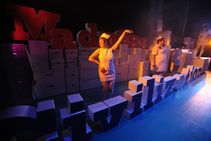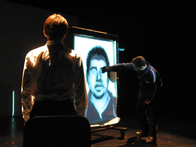|
Jacqueline Lawton: How long have you lived and worked as a playwright in DC? What brought you here? Why have you stayed?
Natsu Onoda Power: I moved to DC in 2006 for a Visiting Assistant Professor job at Georgetown. Prior to that, I lived in Chicago finishing my Ph.D. and running a very small theatre company called Live Action Cartoonists. I was heartbroken to leave Chicago, but now I LOVE my job... I've been blessed to have such incredible colleagues and students. My position became tenure-track in 2011 so now I am here for the long haul. JL: Have you ever been a member of a DC area playwrights writing group? If so, did you find it useful? Would you recommend that other playwrights join them? NOP: I haven't. I am curious. I'd love to learn more about such groups. JL: In DC, we have the Capital Fringe Festival, the Source Theatre Festival, the Kennedy Center's Page-to-Stage Festival, the Black Theater Festival, and the Hip Hop Theatre Festival. We also have the Mead Lab at Flashpoint Theater Lab Program. Have you participated in any of these? If so, can you speak about your experience? NOP: I have done two projects with the Fringe, one as a writer/director and one as a designer. I love all the energy the Fringe brings to the city. I also participated in the Source Festival as one of the 10 minute play directors. This was a true challenge... primarily because of scheduling, but also because the play I was assigned to direct was very different from my usual style. When I think back, it was a really valuable experience in stretching myself... and everyone can (and should!) safely stretch themselves for a ten-minute project! The same goes for my Mead Lab experience. I participated as one of the ten-minute-play directors for Rorschach Theater's Klecksography project in 2010. I had a lot of fun with that. These projects connect you to people and communities that you wouldn't otherwise meet (especially if you are not a naturally social person). JL: What kind of work do you do to pay the bills? How do you balance this work with your writing? NOP: I love my job. I am one of the most fortunate people in the entire world. I teach theater and performance to young, brilliant people. Students give me so much inspiration. I do most of my research for plays through teaching. For example, I taught a course on Madness and Performance while I was working on a play called Madness and Civilization, partly an adaptation of Michel Foucault's book of the same title and partly about my brother-in-law who was in a group home for the mentally ill. Again, I have an amazing job. I get to share my research with students and really investigate the material through discussions and performance exercises. These are my best classes too — I just have so much passion and dedication in the classroom when my pedagogical, scholarly and creative interests align in such a direct, immediate way. JL: How many plays have you had produced in the DC area? Were any of these plays self-produced? If so, where and what did you learn from that experience? NOP: I have written and directed six plays at Georgetown, one for the Fringe, and one at the Studio 2ndStage. My Fringe show was self-produced... I did it on the third floor of my husband's restaurant (he is the owner/chef). It was such a garage-band operation, I was the writer-director-projections designer-costume designer-light board operator-box office. I bought my lights at IKEA and installed them myself on the ceiling. I built my tech booth out of milk crates. It was hilarious. Oh and I cracked my windshield transporting a set piece too. I am currently in the process of working on a show with Synetic. JL: If you could be produced at any theatre in DC, which would it be and why? NOP: Hmmm not sure. I think it's more about the team than the venue. JL: DC audiences are ... NOP: Not sure if I can make general statements about audiences anywhere. Audiences are just individuals, and that's why it's so hard to make theater that caters to everyone's taste. JL: DC actors, designers and directors are .. NOP: I have met some amazing people here. Actors, designers, directors, and also some really talented and dedicated technicians, people who would stay with me until 3am fixing a prop. JL: DC critics are ... NOP: I don't read enough reviews to make general statements about dc critics... But I will say that the critics I have met in person (for interviews, mostly) have all been so insightful, and FASCINATING as people. This was shocking (in a good way) and took some getting used to. My husband is a chef and i was more used to his relationship to food critics. He is not even supposed to know what they look like! JL: How do you feel the DC theatre community has addressed the issues of race and gender parity ? How has this particular issue impacted you and your ability to get your work produced on the main stages? NOP: Hmmmm!!! I have a lot to say about it and can't really contain it here. Can I get back to you on that? JL: Absolutely! Now, what advice do you have for an up and coming DC based playwright or a playwright who has just moved to D.C.? NOP: I wish I had good advice... but I don't. JL: What's next for you as a playwright? Where can we keep up with your work? NOP: I am doing a show with Synetic that goes up in December. It's an adaptation of Georges Melies 1902 film A Trip to the Moon, combined with other narratives of lunar travel, real and fictional. It's secretly about romantic idealization and disappointment. After that, I have a show with Forum in July. It is a reworking of a project I did at Georgetown in 2008, a collection of stories from DC's transgender community/communities.
0 Comments
Your comment will be posted after it is approved.
Leave a Reply. |
My BlogI'm a playwright, dramaturg, and teaching artist. It is here where you'll find my queries and musings on life, theater and the world. My posts advocate for diversity, inclusion, and equity in the American Theatre and updates on my own work. Please enjoy!
Categories
All
Archives
June 2020
Reading List
|



